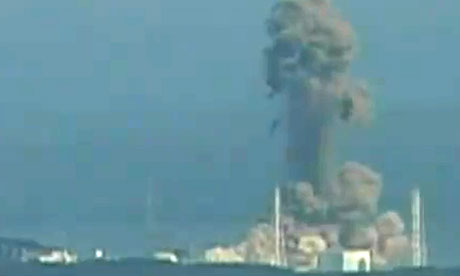 |
| March 13th, a year ago |
Energy News has today a whole series of news snippets gathered from the media in the anniversary of the Fukushima nuclear catastrophe. While, as we all know, most media have silenced or downplayed the severity of the nuclear disaster, there's a lot of columns and TV magazines to fill with words and words are sometimes more than meaningless ritual blah-blah.
For example Asahi remembers (EneNews excerpt) the so-called 'Fukushima 50', which were more than that figure and were the workers of Fukushima II at the time of the disaster, risking their lives in arguably futile attempts to prevent the worst. Three of them spoke out:
[Kenichi's] internal radiation exposure has been measured at 5,000 counts per minute, or around five times the upper range for an average person. “I sometimes think maybe I shouldn’t get married and I won’t be able to have kids.”
...
Many fainted from heatstroke, but Kenichi notes that if they had to go home they would not be paid. Those who blamed the plant’s operators for their symptoms were told not to come back the next day.
...
Kenichi predicted that the reactors would melt down in strict number order, from the No. 1 reactor upward, as the cooling system runs from the first to the sixth reactor.
...
None of them trust anything TEPCO or the government says.
Another concern for Asahi (EneNews excerpt) is depopulation, even if the government, criminally, has declined to evacuate the most affected areas (what means most of Fukushima and parts of neighboring areas, while all East/North Honsu is directly polluted):
Serious concerns about whether depopulation is now a reality.
...
Other estimates also predict a gloomy picture for the future population of Fukushima Prefecture.
...
An Environment Ministry official offered this explanation: “There is the possibility that radiation levels may not fall even if the area is decontaminated”.
...
[Isao Tanihata at the Osaka research center's Cosmonuclear Physics Division] said, “There may be a need for drastic action, such as removing large sections of mountains and valleys, including the vegetation found there”.
Nothing about saving the people by relocating them outside the radiation hell: they are just worried about how to keep and recover the highway linking North Honsu with the rest of Japan. They may well destroy all Japan in the process. They are true madmen.
Russia Today (EneNews excerpt) cites US nuclear engineer Arnie Gunderssen who
[...] Total clean-up of the radioactive zone around the earthquake- and tsunami-affected Fukushima nuclear power plant will cost up to half a trillion dollars and many years of hard work, Arnold Gundersen, energy adviser at Fairwinds Associates, told RT.
“The entire north of Japan has a public health hazard,” claims Gundersen, who has found traces of radioactive waste in Tokyo, some 250 kilometers from Fukushima. [...]
But Gundersen is succumbing to nuclear optimism, I'd say because radiation is forever: decontamination is effectively impossible except for very localized issues and there is no way to destroy radiation (or radioactive sources other than by expanding their radiation) - they must be kept in 'safe' places forever. Radiation only decays with time, so extremely slowly for most sources that it is effectively forever in terms of human history, and even biological history altogether.
The only way to avoid contamination is to abandon nuclear power altogether (or at least as much as possible and as soon as possible) and to store all radioactive debris accumulated since the 1940s into some geologically stable pit of doom, far away from populated areas.
It is an existential threat to humankind. Chernobyl polluted half Europe, Fukushima has effectively destroyed Japan (mostly thanks to the Japanese government's mismanagement), the exact effects of Three Mile Island are not well known, there is nuclear debris all around, beginning with hotspots like Murmansk or Los Alamos (these are just two examples) to kill all us many times, the huge number of nuclear reactors in France (and secondarily Spain and the UK) make Western Europe the most likely candidate for the next nuclear disaster...
A nuclear power plant not far from where I live is conceived exactly like Fukushima: a simple loss of power would cause it to descend into uncontrolled meltdown, destroying everything between Valladolid and Pamplona. While Garoña NPP was supposed to be decommissioned in 2011, the Spanish government has extended its legal lifetime twice already.
It is just one example: France is full of nuclear reactors and other facilities, some of which have got serious problems this year. France is just one example, the USA and even Russia have also got nuclear accidents only this year. Even if they are no Fukushimas, it's clear that there is a serious risk of something similar happening any day, with no advice and no solution.
See also in this blog: category: nuclear catastrophe.
Update: Xinhua (EneNews excerpt) cites Gundersen in more detail anyhow, saying that Fukushima is ten times worse than Chernobyl.
Update: Fukushima Diary cites (and translates) the Mayor of Matsumoto, Mr. Sugava:
Update: Xinhua (EneNews excerpt) cites Gundersen in more detail anyhow, saying that Fukushima is ten times worse than Chernobyl.
Update: Fukushima Diary cites (and translates) the Mayor of Matsumoto, Mr. Sugava:
On today’s News9 of NHK, Mr.Sugaya, the Matsumoto city mayor, who has been involved in medical care in Chernobyl clearly stated, “After all, Tokyo citizens were exposed.”. Did you see it ? Media has started reporting Tokyo citizens have been exposed. Yes, I thought “exposure” was a story of WW2 too but I have been too. I’m Hibakusha too.
No comments:
Post a Comment
Please, be reasonably respectful when making comments. I do not tolerate in particular sexism, racism nor homophobia. The author reserves the right to delete any abusive comment.
Comment moderation before publishing is... ON